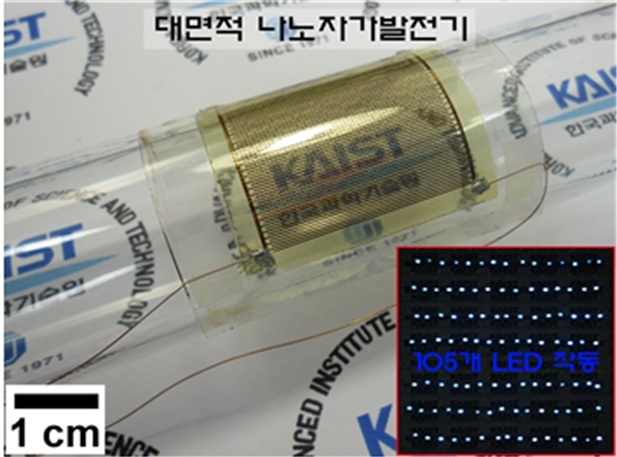
Professor Keon Jae Lee’s team from the Department of Materials Science and Engineering has developed a highly efficient nanogenerator. The research findings were published on the April 23 issue of Advanced Materials. The research project was sponsored by the KOLON-KAIST LifeStyle Innovation Center and the Ministry of Science, ICT and Future Planning. Nanogenerators, as its name suggests, is a small device that converts mechanical or thermal energy, harvested through vibration or mechanical perturbations, into readily usable electrical energy. These devices have promising applications in achieving sustainable energy, especially when adapted to environments void of electrical power sources.

Nanogenerators are composed of flexible nanomaterials that respond to minute changes in pressure and external forces. These minor perturbations are transformed into readily usable electrical energy. Because of the lack of traditional electrical components such as batteries and wires, these devices can be installed into flexible electronics, as well as wearable devices and robots. However, its low energy efficiency, as well as its prohibitively difficult fabrication process, prevented the technology from being utilized to its full potential.
However, Professor Lee’s team utilized a laser lift-off (LLO) process to produce a piezoelectric thin film nanogenerator of a 2 cm by 2 cm area on flexible substrates. From a slight mechanical deformation, these plastic substrates can produce a 250 Volt output, enough to operate 100 light-emitting diodes (LEDs). Professor Lee’s new nanogenerator boasts unprecedented energy conversion efficiency that is 40 times higher than the performance of any previously tested nanogenerator. “The new nanogenerator can harness electricity from a wide variety of natural sources - from wind, vibrations, sound, human heartbeats, pressure from blood circulation, and muscular movements,” Professor Lee stated. Flexible and Nanobio Device Lab (FAND) is currently working on the construction of a three-dimensional composition of flexible piezoelectric thin films to improve electrical output.
Professor Lee heads the FAND at KAIST. He received his bachelor’s and doctorate degree from Yonsei University and University of Illinois at Urbana Champaign, respectively. He also serves as the editor of Current Applied Physics, an official journal of the Korean Physical Society. Professor Lee possesses over 40 licensed patents in flexible and nano-electronics.

